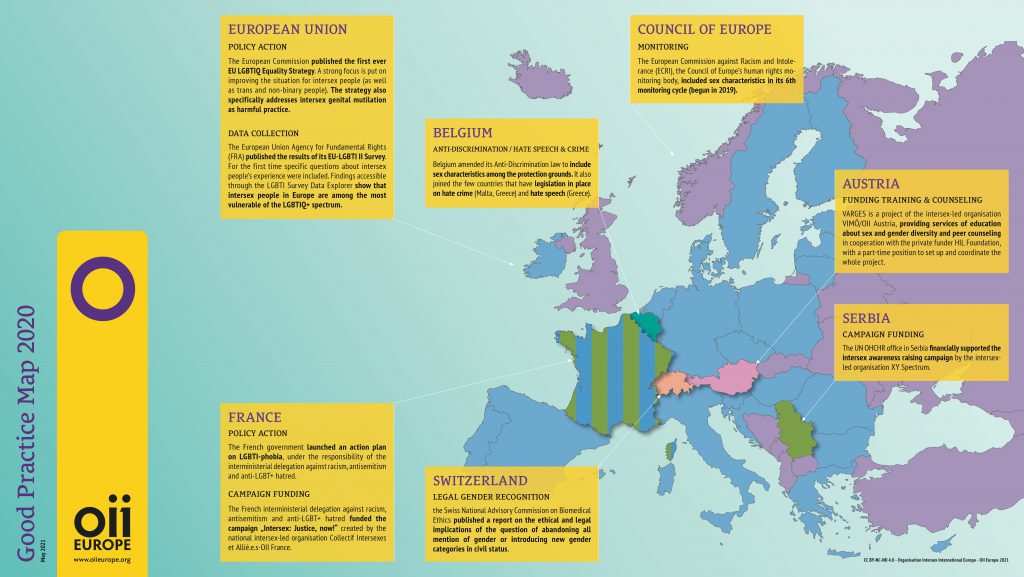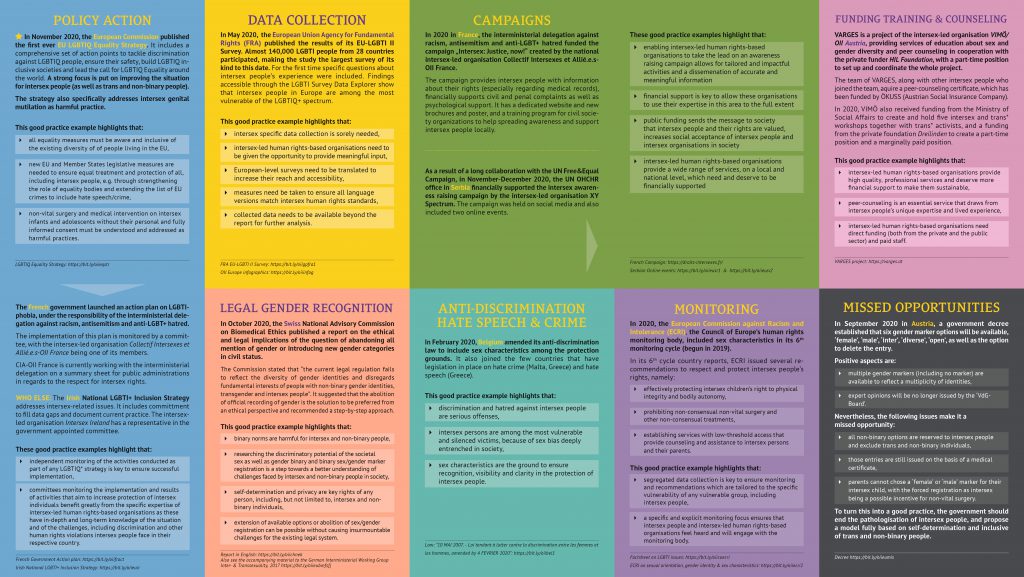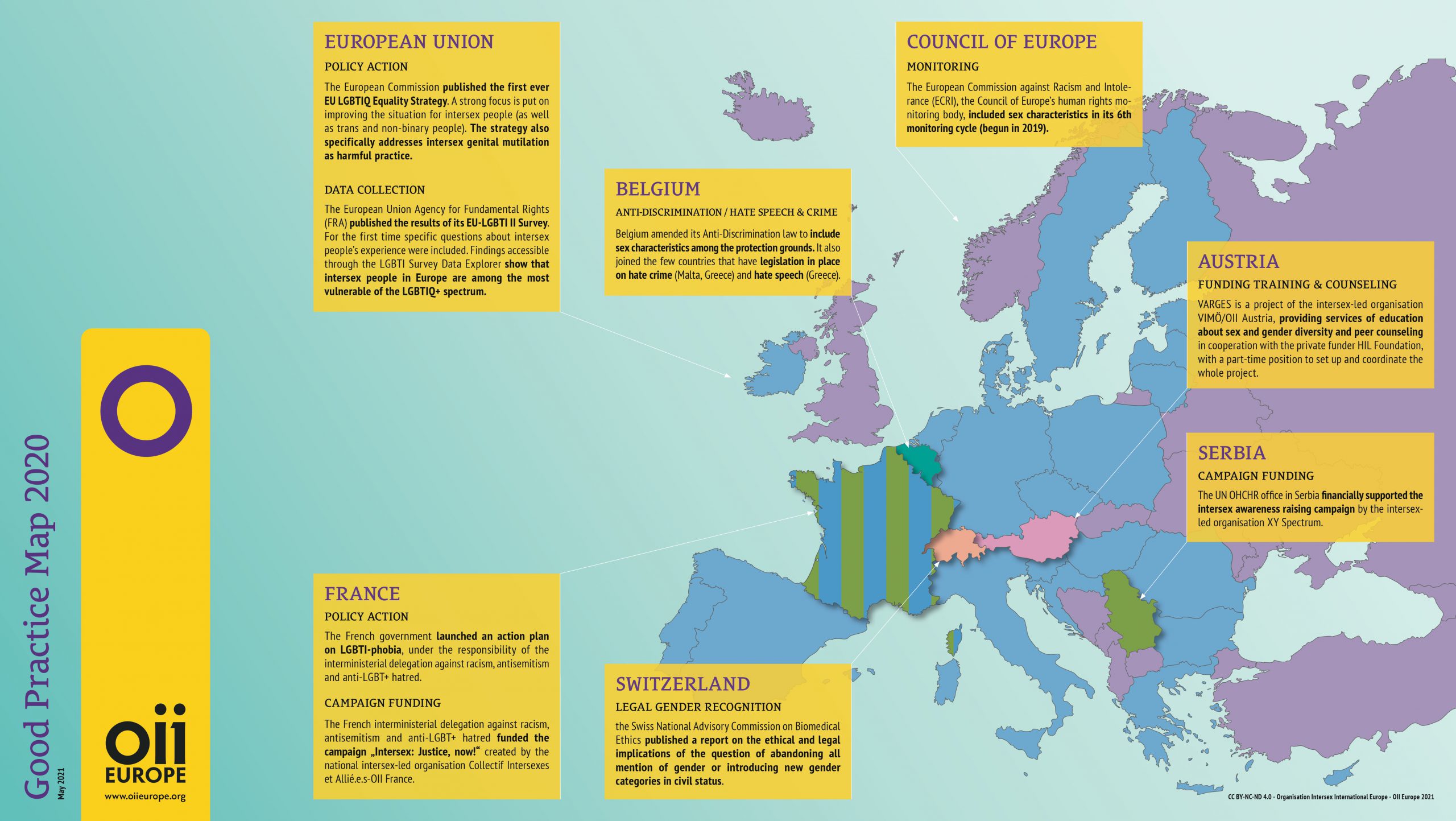
Today, 17th of May 2021, OII Europe is proud to present the Intersex Good Practice Map 2020.
The map features nine examples of good practices from the areas of policy action, data collection, monitoring, legal gender recognition, campaigning, anti-discrimination, legislation against hate speech/crime and funding training & counseling.
(see details below)
Following text is the content of the Good Practice Map 2020

Policy Action
In November 2020, the European Commission published the first ever EU LGBTIQ Equality Strategy. It includes a comprehensive set of action points to tackle discrimination against LGBTIQ people, ensure their safety, build LGBTIQ inclusive societies and lead the call for LGBTIQ Equality around the world.
A strong focus is put on improving the situation for intersex people (as well as trans and non-binary people).
The strategy also specifically addresses intersex genital mutilation as harmful practice.
This good practice example highlights that:
- all equality measures must be aware and inclusive of the existing diversity of of people living in the EU,
- new EU and Member States legislative measures are needed to ensure equal treatment and protection of all, including intersex people, e.g. through strengthening the role of equality bodies and extending the list of EU crimes to include hate speech/crime,
- non-vital surgery and medical intervention on intersex infants and adolescents without their personal and fully informed consent must be understood and addressed as harmful practices.
LGBTIQ Equality Strategy: https://bit.ly/oiieqstr
-/-
The French government launched an action plan on LGBTI-phobia, under the responsibility of the interministerial delegation against racism, antisemitism and anti-LGBT+ hatred.
The implementation of this plan is monitored by a committee, with the intersex-led organisation Collectif Intersexes et Allié.e.s-OII France being one of its members.
CIA-OII France is currently working with the interministerial delegation on a summary sheet for public administrations in regards to the respect for intersex rights.
Who else: The Irish National LGBTI+ Inclusion Strategy addresses intersex-related issues. It includes committment to fill data gaps and document current practice. The intersex-led organisation Intersex Ireland has a representative in the government appointed committee.
These good practice examples highlight that:
- independent monitoring of the activities conducted as part of any LGBTIQ* strategy is key to ensure successful implementation,
- committees monitoring the implementation and results of activities that aim to increase protection of intersex individuals benefit greatly from the specific expertise of intersex-led human rights-based organisations as these have in-depth and long-term knowledge of the situation and of the challenges, including discrimination and other human rights violations intersex people face in their respective country.
French Government Action plan: https://bit.ly/oiifract
Irish National LGBTI+ Inclusion Strategy: https://bit.ly/oiieuir
Data Collection
In May 2020, the European Union Agency for Fundamental Rights (FRA) published the results of its EU-LGBTI II Survey. Almost 140,000 LGBTI people from 28 countries participated, making the study the largest survey of its kind to this date. For the first time specific questions about intersex people’s experience were included. Findings accessible through the LGBTI Survey Data Explorer show that intersex people in Europe are among the most vulnerable of the LGBTIQ+ spectrum.
This good practice example highlights that:
- intersex specific data collection is sorely needed,
- intersex-led human rights-based organisations need to be given the opportunity to provide meaningful input,
- European-level surveys need to be translated to increase their reach and accessibility,
- measures need be taken to ensure all language versions match intersex human rights standards,
- collected data needs to be available beyond the report for further analysis.
FRA EU-LGBTI II Survey: https://bit.ly/oiigpfra1
OII Europe infographics: https://bit.ly/oiiinfog
Legal Gender Recognition
In October 2020, the Swiss National Advisory Commission on Biomedical Ethics published a report on the ethical and legal implications of the question of abandoning all mention of gender or introducing new gender categories in civil status.
The Commission stated that “the current legal regulation fails to reflect the diversity of gender identities and disregards fundamental interests of people with non-binary gender identities, transgender and intersex people”. It suggested that the abolition of official recording of gender is the solution to be preferred from an ethical perspective and recommended a step-by-step approach.
This good practice example highlights that:
- binary norms are harmful for intersex and non-binary people,
- researching the discriminatory potential of the societal sex as well as gender binary and binary sex/gender marker registration is a step towards a better understanding of challenges faced by intersex and non-binary people in society,
- self-determination and privacy are key rights of any person, including, but not limited to, intersex and non-binary individuals,
- extension of available options or abolition of sex/gender registration can be possible without causing insurmountable challenges for the existing legal system.
Report in English: https://bit.ly/oiichnek
Also see the accompanying material to the German Interministerial Working Group Inter- & Transsexuality, 2017 https://bit.ly/oiieubmfsfj
CAMPAIGNS
In 2020 in France, the interministerial delegation against racism, antisemitism and anti-LGBT+ hatred funded the campaign „Intersex: Justice, now!“ created by the national intersex-led organisation Collectif Intersexes et Allié.e.s-OII France.
The campaign provides intersex people with information about their rights (especially regarding medical records), financially supports civil and penal complaints as well as psychological support. It has a dedicated website and new brochures and poster, and a training program for civil society organizations to help spreading awareness and support intersex people locally.
As a result of a long collaboration with the UN Free&Equal Campaign, in November-December 2020, the UN OHCHR office in Serbia financially supported the intersex awareness raising campaign by the intersex-led organisation XY Spectrum. The campaign was held on social media and also included two online events.
These good practice examples highlight that:
- enabling intersex-led human rights-based organisations to take the lead on an awareness raising campaign allows for tailored and impactful activities and a dissemenation of accurate and meaningful information
- financial support is key to allow these organisations to use their expertise in this area to the full extent
- public funding sends the message to society that intersex people and their rights are valued, increases social acceptance of intersex people and intersex organisations in society
- intersex-led human rights-based organisations provide a wide range of services, on a local and national level, which need and deserve to be financially supported
French Campaign: https://droits-intersexes.fr/
Serbian Online events: https://bit.ly/oiieusr1 & https://bit.ly/oiieusr2
Anti-discrimination / Hate speech & crime
In February 2020, Belgium amended its anti-discrimination law to include sex characteristics among the protection grounds. It also joined the few countries that have legislation in place on hate crime (Malta, Greece) and hate speech (Greece).
This good practice example highlights that:
- discrimination and hatred against intersex people are serious offenses,
- intersex persons are among the most vulnerable and silenced victims, because of sex bias deeply entrenched in society,
- sex characteristics are the ground to ensure recognition, visibility and clarity in the protection of intersex people.
Law: “10 MAI 2007. – Loi tendant à lutter contre la discrimination entre les femmes et les hommes, amended by 4 FEVRIER 2020”: https://bit.ly/oiibel1
Monitoring
In 2020, the European Commission against Racism and Intolerance (ECRI), the Council of Europe’s human rights monitoring body, included sex characteristics in its 6th monitoring cycle (begun in 2019).
In its 6th cycle country reports, ECRI issued several recommendations to respect and protect intersex people’s rights, namely:
- effectively protecting intersex children’s right to physical integrity and bodily autonomy,
- prohibiting non-consensual non-vital surgery and other non-consensual treatments,
- establishing services with low-threshold access that provide counseling and assistance to intersex persons and their parents.
This good practice example highlights that:
- segregated data collection is key to ensure monitoring and recommendations which are tailored to the specific vulnerability of any vulnerable group, including intersex people,
- a specific and explicit monitoring focus ensures that intersex people and intersex-led human rights-based organisations feel heard and will engage with the monitoring body.
Factsheet on LGBTI issues: https://bit.ly/oiicoecri
ECRI on sexual orientation, gender identity & sex characteristics: https://bit.ly/oiiecri2
Funding training & counseling
VARGES is a project of the intersex-led organisation VIMÖ/OII Austria, providing services of education about sex and gender diversity and peer counseling in cooperation with the private funder HIL Foundation, with a part-time position to set up and coordinate the whole project.
The team of VARGES, along with other intersex people who joined the team, aquire a peer-counseling certificate, which has been funded by ÖKUSS (Austrian Social Insurance Company).
In 2020, VIMÖ also received funding from the Ministry of Social Affairs to create and hold five intersex and trans* workshops together with trans* activists, and a funding from the private foundation Dreilinden to create a part-time position and a marginally paid position.
This good practice example highlights that:
- intersex-led human rights-based organisations provide high quality, professional services and deserve more financial support to make them sustainable,
- peer-counseling is an essential service that draws from intersex people’s unique expertise and lived experience,
- intersex-led human rights-based organisations need direct funding (both from the private and the public sector) and paid staff.
VARGES project: https://varges.at
Missed Opportunities
In September 2020 in Austria, a government decree established that six gender marker options will be available, ‘female’, ‘male’, ‘inter’, ‘diverse’, ‘open’, as well as the option to delete the entry.
Positive aspects are:
- multiple gender markers (including no marker) are available to reflect a multiplicity of identities,
- expert opinions will be no longer issued by the ‘VdG-Board’.
Nevertheless, the following issues make it a missed opportunity:
- all non-binary options are reserved to intersex people and exclude trans and non-binary individuals,
- those entries are still issued on the basis of a medical certificate,
- parents cannot chose a ‘female’ or ‘male’ marker for their intersex child, with the forced registration as intersex being a possible incentive for non-vital surgery.
To turn this into a good practice, the government should end the pathologisation of intersex people, and propose a model fully based on self-determination and inclusive of trans and non-binary people.
Decree https://bit.ly/oiieumis


